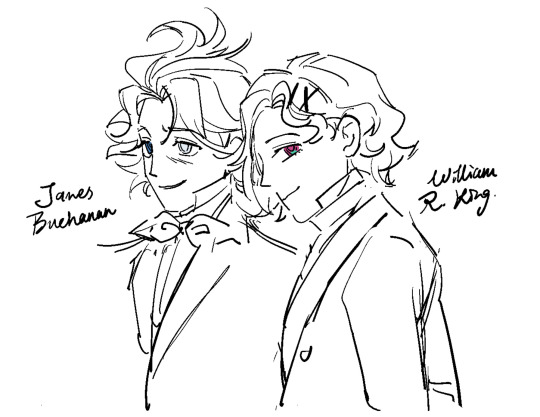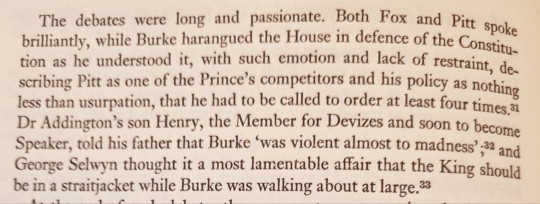#Edmund Burke
Text
Burke discerned two radically distinct responses to beauty in general, and to natural beauty in particular: one originating in love, the other in fear. When we are attracted by the harmony, order and serenity of nature, so as to feel at home in it and confirmed by it, then we speak of its beauty; when, however, as on some wind-blown mountain crag, we experience the vastness, the power, the threatening majesty of the natural world, and feel our own littleness in the face of it, then we should speak of the sublime. Both these responses are elevating; both lift us out of the ordinary utilitarian thoughts that dominate our practical lives.
Roger Scruton, Beauty: A Very Short Introduction
#quote#Roger Scruton#Scruton#beauty#aesthetics#Edmund Burke#Burke#philosophy#sublime#nature#psychology#perception#power#love#fear#emotions
185 notes
·
View notes
Text
“Perché il male trionfi è sufficiente che i buoni rinuncino all'azione.”
— Edmund Burke
45 notes
·
View notes
Text
@stardust-0517 ’s design i did a long time ago



#19th century rpf#antebellum#james buchanan#william rufus king#amrev#amrev fandom#john jay#robert r. livingston#john marshall#patrick henry#edmund burke#gouverneur morris#thomas paine#andrew jackson#martin van Buren
28 notes
·
View notes
Text

George Selwyn absolutely roasting Burke during the 1788 Regency Crisis
21 notes
·
View notes
Text
As opposed to beauty, the sublime does not cause an immediate feeling of pleasure. As in Burke, the initial sensation in reaction to the sublime is pain or displeasure. The sublime is too enormous, too huge for the imagination, which cannot capture it and is unable to condense it into a picture. Thus, the subject is shocked and overwhelmed by it. This is what constitutes the negativity of the sublime. When looking at vast natural phenomena, the subject initially feels powerless. But it regains its composure through that 'self-preservation of quite another kind'. It takes refuse in the inwardness of reason and its idea of infinity compared to which 'everything in nature is small'.
Byung-Chul Han, Saving Beauty (trans. Daniel Steuer)
21 notes
·
View notes
Text


It is now sixteen or seventeen years since I saw the Queen of France, then the Dauphiness, at Versailles; and surely never lighted on this orb, which she hardly seemed to touch, a more delightful vision. I saw her just above the horizon, decorating and cheering the elevated sphere she had just begun to move in, glittering like the morning star full of life and splendour and joy.
Oh, what a revolution! and what a heart must I have, to contemplate without emotion that elevation and that fall! Little did I dream, when she added titles of veneration to those of enthusiastic, distant, respectful love, that she should ever be obliged to carry the sharp antidote against disgrace concealed in that bosom; little did I dream that I should have lived to see such disasters fallen upon her, in a nation of gallant men, in a nation of men of honour, and of cavaliers! I thought ten thousand swords must have leaped from their scabbards, to avenge even a look that threatened her with insult.
But the age of chivalry is gone; that of sophisters, economists, and calculators has succeeded, and the glory of Europe is extinguished forever. Never, never more, shall we behold that generous loyalty to rank and sex, that proud submission, that dignified obedience, that subordination of the heart, which kept alive, even in servitude itself, the spirit of an exalted freedom! The unbought grace of life, the cheap defence of nations, the nurse of manly sentiment and heroic enterprise is gone. It is gone, that sensibility of principle, that chastity of honour, which felt a stain like a wound, which inspired courage whilst it mitigated ferocity, which ennobled whatever it touched, and under which vice itself lost half its evil, by losing all its grossness.
Edmund Burke
#marie antoinette#french monarchy#french royalty#edmund burke#18th century#ancien regime#long live the queue
38 notes
·
View notes
Text

Edmund Burke saw society as an association of the dead, the living and the unborn. Its binding principle is not contract, but something more akin to love. Society is a shared inheritance for the sake of which we learn to circumscribe our demands, to see our own place in things as part of a continuous chain of giving and receiving, and to recognise that the good things we inherit are not ours to spoil.
Sir Roger Scruton, How to Be a Conservative
#scruton#roger scruton#quote#edmund burke#society#association of the dead#the living and the unborn#conservatism#english#statue#kiss#heritage#tradition#custom
68 notes
·
View notes
Text
The “beauty is terror” girlies really need to read some Burke
18 notes
·
View notes
Text
youtube
NEW VIDEO!
If there is cosmic horror, there must be something that serves as its opposite…
Join us as we shudder before the beautiful.
#tale foundry#writing community#writing inspiration#writers of tumblr#writers on tumblr#cosmic horror#biblically accurate angels#biblically accurate angel#lovecraft#lovecraftian#writing horror#horror writing#horror fiction#speculative fiction#weird fiction#hp lovecraft#the nameless city#edmund burke#clarke ashton smith#the city of singing flame#annihilation#jeff vandermeer#Youtube#peter mohrbacher#angelarium#clive barker
28 notes
·
View notes
Text

206 notes
·
View notes
Text

"La sola cosa necessaria per il trionfo del male è l'inoperosità dei buoni."
(La traduzione, un po' raccogliticcia, è mia.)
14 notes
·
View notes
Text

#pay attention#educate yourself#educate yourselves#knowledge is power#reeducate yourself#reeducate yourselves#think for yourself#think for yourselves#think about it#edmund burke
37 notes
·
View notes
Text

“Those who don't know history are doomed to repeat it.”
35 notes
·
View notes
Text
RIP Edmund Burke you would’ve loved H.P. Lovecraft and M. Night Shyamalan
#- HK#absolutely not what I was expecting#from his essay on the Sublime and Beautiful#mobile#x#Edmund Burke
7 notes
·
View notes
Text

"Ces pères de l’athéisme ont une bigoterie à eux ; et pour déclamer contre les moines, ils ont appris à se servir du langage monacal. Mais en plusieurs choses, ils appartiennent au siècle. Ils savent faire appel aux ressources de l’intrigue pour suppléer aux défauts du raisonnement et de l’esprit. Ils renforcent leur système de monopole littéraire d’une activité inlassable pour noircir et discréditer par tous les moyens tous ceux qui ne font pas partie de leur faction. Aux yeux de ceux qui observaient leur conduite, il était clair depuis longtemps que pour transformer l’intolérance de leur parole et de leur plume en une persécution qui frapperait la propriété, la liberté et la vie même de leurs concitoyens, il ne leur manquait que le pouvoir nécessaire […] En définitive, les résistances rencontrées comme les succès remportés firent qu’un zèle violent et malfaisant, d’une espèce inconnue jusqu’ici dans le monde, s’empara de leurs esprits et que leur commerce, au lieu d’être agréable et instructif, devint parfaitement révoltant. Un esprit de cabale, d’intrigue et de prosélytisme dominait toutes leurs pensées, leurs moindres paroles, leurs moindres actions. Et comme le zèle de la controverse tourne bientôt les idées vers l’usage de la force, ils entreprirent de s’introduire près des princes étrangers en entrant en correspondance avec eux, dans l’espoir qu’en s’appuyant de leur autorité, qu’ils commencèrent par flatter, ils pourraient venir à bout de produire les changements qu’ils avaient en vue. Il leur était indifférent que ces changements fussent opérés par la foudre du despotisme ou par le tremblement de terre d’une commotion populaire […] Dans le même dessein qui les faisait intriguer avec les princes, ils cultivaient avec une diligence toute particulière les pouvoirs d’argent en France ; et enfin, mettant notamment à profit les bonnes grâces de quelques personnes dont les charges spéciales leur assuraient l’audience la plus sûre et la plus étendue, ils s’emparèrent avec grand soin de toutes les avenues de l’opinion."
Edmund Burke, Réflexions sur la révolution de France, trad. Pierre Andler, 1790.
10 notes
·
View notes
Text
“The age of chivalry is gone. That of sophisters, economists, and calculators, has succeeded; and the glory of Europe is extinguished for ever.”
Edmund Burke
4 notes
·
View notes